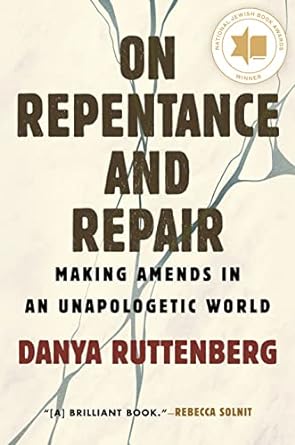Book Review: “On Repentance And Repair” by Rabbi Danya Ruttenberg

I had long silently harboured a deep foundational belief that what the Church taught about forgiveness was wrong. My experiences of it being used by various Christian people, as well as the Church, against me to guilt me, reinforced it. Not only that, secular people and the media used that same teaching for the same purpose.
On Repentance And Repair (Beacon Press 2022) by Rabbi Danya Ruttenberg has now affirmed my concern. This book should be required remedial reading for all clergy and seminary students.
In Judaism, repentance, forgiveness and atonement are separate categories. The emphasis is on repentance, before forgiveness even comes into it. Yet in Christianity, and thus also the secular world which has assimilated its concept, forgiveness is expected, nay demanded, first and foremost, before any action by the harmdoer.
Such focus has had damaging results: removing questions of accountability, any incentive for harmdoer responsibility, putting the onus on the victim without any redress. Bonhoeffer declared forgiveness without repentance was ‘cheap grace’.
Favouring intent over impact privileges the more powerful as well as the status quo, meaning there’s no change, no transformation. Resistance to facing harm head on is a form of gaslighting, denying both reality and the real harm inflicted. Such theology was used after the civil war when white northerners immediately preached forgiveness and unity with white southerners (minus repentance and transformation) at the expense of justice as well as safety for Black Americans. Which didn’t disrupt the North’s status quo but reinscribed privileged white supremacy.
In our society with its heightened sense of individualism, the focus is on individual rights, rather than on our obligations towards one another. A hyper-capitalist ethos with instant gratification also shys us away from the hard work of process and transformation. We sometimes commit the greatest harm when convincing ourselves we’re the hurt ones, using that to justify our damaging Behaviour. Justification is often from fear of shame, guilt, humiliation, loss of reputation or power which tarnish our belief we’re always good.
Ruttenberg uses the ancient precepts of Maimonides as a better guideline. For him, repentance involves several steps: naming and owning the harm, starting to change, restitution and accepting consequences, (all before) apology, and finally, making different choices (evidence of transformation). All are fully detailed with clarification and example, including the pitfalls of doing otherwise.
We become defensive to get ourselves (and harmdoers) off the hook regarding consequences. We’re not very good at humbly accepting actions have consequences. However, as a society we are obligated to hold harmdoers to accountability and not to reward them with more opportunities to gain wealth, prestige, power, celebrity. Furthermore, there should be no strings attached either to amends or forgiveness. The honest owning of what we have been and done and what we’re also capable of becoming is hard painful work; not instant but a process. And part of the owning is recognizing there is systemic oppression and privilege in which we may even unknowingly be participants. We can’t conceive of justice when we don’t even recognize the injustice.
There are chapters on repentance in personal relationships, harm in the Public Square (social media), Institutional obligations, as well as on national repentance and our current justice systems. All contain tips, advice and wisdom re past failures and better outcomes we’d all do well to learn from. Without transformation there’s been no repentance, the cycle endlessly repeats, negating all attempts.
Regarding justice systems, she mentions only 3 questions are currently asked: What laws have been broken, who did it, what do they deserve? None of which have anything to do with the harm to either the victim or community/society and how they should be served. She also elaborates on and critiques various forms of justice alternatives and the criticisms of them.
The chapters on forgiveness and atonement alone are worth the price and read, for the relief and enlightenment they offer, as some of Jesus’ Jewish roots are restored. Afterwards you’ll know what forgiveness is and isn’t, what’s involved and not, required and not, what it offers and doesn’t. No one can give forgiveness for crimes committed against other people.
There are two Hebrew words involved, with important shades of meaning for interpretation and application. Healing, for either victim or harmdoer, can come with or without it. Yet in Christianity (& generally too) forgiveness has been often weaponized, pressuring victims to forgive even when the harmdoer hasn’t done all or even any of the work. The media asks when people are still in the first state of shock, disbelief, horror, pain and grief. Harmdoers who are unaccountable seem to think they’re entitled to it, backed up by general ‘god-given’ victim requirements. The victim becomes the harmdoer, compounding their trauma!
The origins of atonement are given, as well as its evolvement. It should never be conflated with or synonymous to forgiveness. Thinking atonement is a relief or release from either guilt or accountability, erases the past or wipes away our shame, is incorrect. It does mean none of that has to define us, even as the past may remain and even haunt us.
How we deal with the truth after its telling defines the success of the project. We don’t have to be perfect; we just have to keep trying, remain faithful.
As indigenous writer Thomas King has written —- “You can’t say in the years to come you would have lived your life differently if only you had heard this story. You’ve heard it now.”
The question is – do we really want to know?
Or grow?
Or change?
Want justice?
